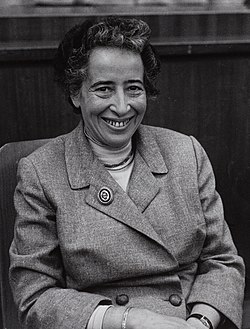Hanna Arendt Quote
Th danger of exchanging the necessary insecurity of philosophical thought for the total explanation of an ideology and its [worldview], is not even so much the risk of falling for some usually vulgar, always uncritical assumption as of exchanging the freedom inherent in man's capacity to think for the straight-jacket of logic with which man can force himself almost as violently as he is forced by some outside power.
Hanna Arendt
Th danger of exchanging the necessary insecurity of philosophical thought for the total explanation of an ideology and its [worldview], is not even so much the risk of falling for some usually vulgar, always uncritical assumption as of exchanging the freedom inherent in man's capacity to think for the straight-jacket of logic with which man can force himself almost as violently as he is forced by some outside power.
Related Quotes
To be ignorant of the sacrifices of others that yielded the blessings I enjoy leaves me exchanging the reality of 'blessing' for the assumption of 'entitlement.' And once that happens, I will forfeit...
Craig D. Lounsbrough
Tags:
america, appreciate, appreciation, assumption, blessing, blessings, cherish, cherishing, entitled, entitlement
About Hanna Arendt
Hannah Arendt (born Johanna Arendt; 14 October 1906 – 4 December 1975) was a German and American historian and philosopher. She was one of the most influential political theorists of the twentieth century.
Her works cover a broad range of topics, but she is best known for those dealing with the nature of wealth, power, fame, and evil, as well as politics, direct democracy, authority, tradition, and totalitarianism. She is also remembered for the controversy surrounding the trial of Adolf Eichmann, for her attempt to explain how ordinary people become actors in totalitarian systems, which was considered by some an apologia, and for the phrase "the banality of evil." Her name appears in the names of journals, schools, scholarly prizes, humanitarian prizes, think-tanks, and streets; appears on stamps and monuments; and is attached to other cultural and institutional markers that commemorate her thought.
Hannah Arendt was born to a Jewish family in Linden in 1906. Her father died when she was seven. Arendt was raised in a politically progressive, secular family, her mother being an ardent Social Democrat. After completing secondary education in Berlin, Arendt studied at the University of Marburg under Martin Heidegger, with whom she engaged in a romantic affair that began while she was his student. She obtained her doctorate in philosophy at the University of Heidelberg in 1929. Her dissertation was entitled Love and Saint Augustine, and her supervisor was the existentialist philosopher Karl Jaspers.
In 1933, Arendt was briefly imprisoned by the Gestapo for performing illegal research into antisemitism. On release, she fled Germany, settling in Paris. There she worked for Youth Aliyah, assisting young Jews to emigrate to the British Mandate of Palestine. When Germany invaded France she was detained as an alien. She escaped and made her way to the United States in 1941. She became a writer and editor and worked for the Jewish Cultural Reconstruction, becoming an American citizen in 1950. With the publication of The Origins of Totalitarianism in 1951, her reputation as a thinker and writer was established, and a series of works followed. These included the books The Human Condition in 1958, as well as Eichmann in Jerusalem and On Revolution in 1963. She taught at many American universities while declining tenure-track appointments. She died suddenly of a heart attack in 1975, leaving her last work, The Life of the Mind, unfinished.
Her works cover a broad range of topics, but she is best known for those dealing with the nature of wealth, power, fame, and evil, as well as politics, direct democracy, authority, tradition, and totalitarianism. She is also remembered for the controversy surrounding the trial of Adolf Eichmann, for her attempt to explain how ordinary people become actors in totalitarian systems, which was considered by some an apologia, and for the phrase "the banality of evil." Her name appears in the names of journals, schools, scholarly prizes, humanitarian prizes, think-tanks, and streets; appears on stamps and monuments; and is attached to other cultural and institutional markers that commemorate her thought.
Hannah Arendt was born to a Jewish family in Linden in 1906. Her father died when she was seven. Arendt was raised in a politically progressive, secular family, her mother being an ardent Social Democrat. After completing secondary education in Berlin, Arendt studied at the University of Marburg under Martin Heidegger, with whom she engaged in a romantic affair that began while she was his student. She obtained her doctorate in philosophy at the University of Heidelberg in 1929. Her dissertation was entitled Love and Saint Augustine, and her supervisor was the existentialist philosopher Karl Jaspers.
In 1933, Arendt was briefly imprisoned by the Gestapo for performing illegal research into antisemitism. On release, she fled Germany, settling in Paris. There she worked for Youth Aliyah, assisting young Jews to emigrate to the British Mandate of Palestine. When Germany invaded France she was detained as an alien. She escaped and made her way to the United States in 1941. She became a writer and editor and worked for the Jewish Cultural Reconstruction, becoming an American citizen in 1950. With the publication of The Origins of Totalitarianism in 1951, her reputation as a thinker and writer was established, and a series of works followed. These included the books The Human Condition in 1958, as well as Eichmann in Jerusalem and On Revolution in 1963. She taught at many American universities while declining tenure-track appointments. She died suddenly of a heart attack in 1975, leaving her last work, The Life of the Mind, unfinished.
